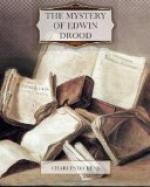‘I remember!’ replies the auctioneer. And the solemn idiot really believes that he does remember.
‘Profiting by your hint,’ pursues Jasper, ’I have had some day-rambles with the extraordinary old fellow, and we are to make a moonlight hole-and-corner exploration to-night.’
‘And here he is,’ says the Dean.
Durdles with his dinner-bundle in his hand, is indeed beheld slouching towards them. Slouching nearer, and perceiving the Dean, he pulls off his hat, and is slouching away with it under his arm, when Mr. Sapsea stops him.
‘Mind you take care of my friend,’ is the injunction Mr. Sapsea lays upon him.
‘What friend o’ yourn is dead?’ asks Durdles. ’No orders has come in for any friend o’ yourn.’
‘I mean my live friend there.’
‘O! him?’ says Durdles. ’He can take care of himself, can Mister Jarsper.’
‘But do you take care of him too,’ says Sapsea.
Whom Durdles (there being command in his tone) surlily surveys from head to foot.
’With submission to his Reverence the Dean, if you’ll mind what concerns you, Mr. Sapsea, Durdles he’ll mind what concerns him.’
‘You’re out of temper,’ says Mr. Sapsea, winking to the company to observe how smoothly he will manage him. ’My friend concerns me, and Mr. Jasper is my friend. And you are my friend.’
‘Don’t you get into a bad habit of boasting,’ retorts Durdles, with a grave cautionary nod. ‘It’ll grow upon you.’
‘You are out of temper,’ says Sapsea again; reddening, but again sinking to the company.
‘I own to it,’ returns Durdles; ‘I don’t like liberties.’
Mr. Sapsea winks a third wink to the company, as who should say: ‘I think you will agree with me that I have settled his business;’ and stalks out of the controversy.
Durdles then gives the Dean a good evening, and adding, as he puts his hat on, ’You’ll find me at home, Mister Jarsper, as agreed, when you want me; I’m a-going home to clean myself,’ soon slouches out of sight. This going home to clean himself is one of the man’s incomprehensible compromises with inexorable facts; he, and his hat, and his boots, and his clothes, never showing any trace of cleaning, but being uniformly in one condition of dust and grit.
The lamplighter now dotting the quiet Close with specks of light, and running at a great rate up and down his little ladder with that object—his little ladder under the sacred shadow of whose inconvenience generations had grown up, and which all Cloisterham would have stood aghast at the idea of abolishing—the Dean withdraws to his dinner, Mr. Tope to his tea, and Mr. Jasper to his piano. There, with no light but that of the fire, he sits chanting choir-music in a low and beautiful voice, for two or three hours; in short, until it has been for some time dark, and the moon is about to rise.
Then he closes his piano softly, softly changes his coat for a pea-jacket, with a goodly wicker-cased bottle in its largest pocket, and putting on a low-crowned, flap-brimmed hat, goes softly out. Why does he move so softly to-night? No outward reason is apparent for it. Can there be any sympathetic reason crouching darkly within him?




